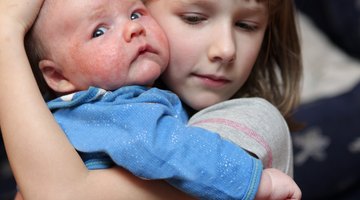Are Kids With Coughs Contagious?
Kids pick up a number of viruses during their childhood and cough through many of the coldest months of the year. Coughing is a normal way in which your child responds to an itchy throat or clears chest congestion. A kid's cough is not necessarily contagious; the root cause of the symptom determines whether he will spread germs to others.
Whooping Cough
Whooping cough, also called pertussis, is a childhood disease characterized by coughing that is contagious. When your child inhales before a long-lasting coughing fit, you will hear a whooping sounds. Pertussis, caused by a bacterial infection, seems like the common cold when symptoms begin -- a runny nose, sneezing and occasional cough precedes the worst of the symptoms. After one to two weeks of cold-like symptoms, your child's cough becomes more exaggerated and severe. Coughing may be so forceful and prolonged that your child's face may turn dusky during a fit and he might vomit from coughing. Protect your child from this contagious condition early in life by vaccinating him during his baby and toddler years. Keep your non-immunized child away from friends or family members who show signs of the disease.
Coughs With Colds

A Bad Cough Is Keeping My Infant Awake at Night
Learn More
Kids often cough when they have a cold, a virus that causes a stuffy, runny nose and chest congestion. By the time your child starts coughing, he has usually shown other symptoms of a cold -- which is contagious -- and may have passed the virus on to others. A cough associated with a cold is not in itself contagious, but a sign of the virus that is. A cough is often the last remnants of a cold to linger long after the virus has run its course.
Allergy-induced Coughs
Allergies, asthma and medical conditions can cause your child to cough and are not at all contagious. Seasonal irritants such as pollen as well as everyday allergens like pet dander and dust irritate your child's airways and cause his body to release histamines. The release of histamines can lead to sinusitis and drainage, which makes your child's throat itchy. Acid reflux is another condition in which your child may cough even though he does not have a cold. You may safely send your child to school with allergy-induced coughs without worrying about making other children sick. Consult your pediatrician to learn how to ease the symptoms of allergies, asthma or gastroesophageal reflux disease in children.
Knowing the Difference

How to Differentiate Between Bronchiolitis and Pneumonia in Children
Learn More
Being able to tell the difference between a cough that stems from a contagious illness and a cough that does not pose a threat to others around your child can take practice. Listen to the cough itself to determine if you're dealing with croup, pertussis or just the occasional throat tickle. Gauge the cause of the cough with further examination of your child. If he develops a fever and show signs of nasal congestion that last just a few days, he most likely is sick and can spread his germs to others. A wet cough combined with chronic congestion or runny eyes only at some times of the year is more likely to be an indicator of allergies. Whenever you are in doubt, take your child to the doctor to determine the cause of his cough.










